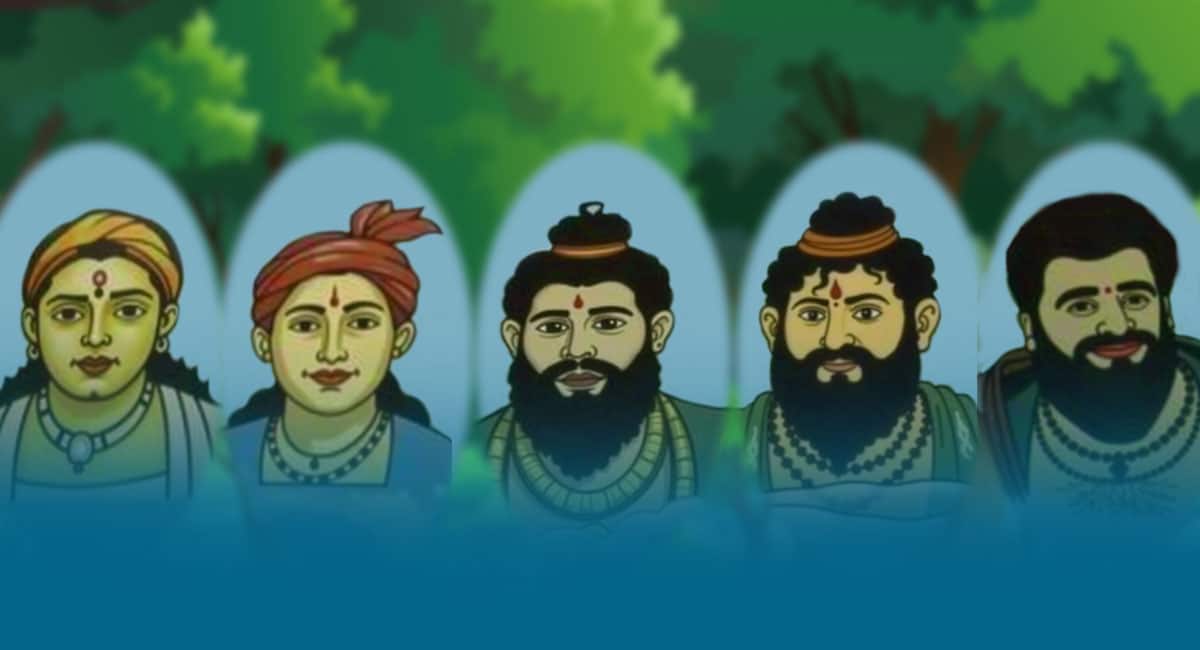The Panchasakha of Odisha: The Jewels of Bhakti and Revolution
Odisha, a land of culture, exquisite temples, and undying devotion, has given birth to some of the most remarkable literary and spiritual figures in Indian history. But among them, five luminaries stand apart, the Panchasakha (Five Friends). These poets, philosophers, and revolutionaries of the 15th and 16th centuries didn’t just write verses; they rewrote the destiny of Odia literature, philosophy, and spirituality.
Who were these five visionaries? What made them torchbearers of devotion and social reform? Buckle up as we dig deep into the lives of the legendary Panchasakha of Odisha, the Balarama Das, Jagannatha Das, Achyutananda Das, Jasobanta Das, and Ananta Das.
The Era of Bhakti and Social Awakening
The 15th and 16th centuries in Odisha were an era of spiritual revolution. The Bhakti Movement swept India, dissolving caste, creed, and class barriers. This movement deeply influenced the Panchasakha, but they didn’t merely adopt it; they redefined it. While saints like Tulsidas, Kabir, and Surdas were preaching devotion elsewhere, Odisha’s five poets created a path that intertwined poetry, philosophy, and social reformation.
They believed in a deeply personal connection with the divine, rejecting hollow rituals and emphasizing inner purity. Each of them had a unique voice, yet their collective wisdom formed an unbreakable chain that still binds the spiritual consciousness of Odisha today.
Meet the Panchasakha of Odisha: The Five Pillars of Devotion and Wisdom
1. Balarama Das: The Divine Storyteller
A genius in blending devotion with simplicity, Balarama Das is best known for his Odia adaptation of the Ramayana, called Dandi Ramayana. His verses brought the celestial story of Lord Rama to the masses in their native language. But he wasn’t just a poet but a reformer who challenged social hierarchies. His Laxmi Purana remains one of the most revolutionary texts, highlighting the strength and dignity of women while questioning the rigid caste system. A true visionary, Balarama Das gave Odisha literature its first major epic in the commoner’s tongue.
2. Jagannatha Das: The Philosopher-Saint
If there is one name that every devotee of Lord Jagannath reveres, it is Jagannatha Das. His magnum opus, the Bhagavata Purana in Odia, became the spiritual backbone of millions. Written in lucid, rhythmic prose, it brought complex Sanskrit scriptures within reach of the ordinary devotee. He preached Nama Bhakti (devotion through chanting the Lord’s name), inspiring a movement that continues today. His philosophical depth and unwavering devotion earned him a special place in the temple town of Puri, where, even today, people worship him as a saint.
3. Achyutananda Das: The Mystic Prophet
Achyutananda Das was not just a poet or devotee but a visionary with profound mystic powers. His writings contain cryptic prophecies about the future of Odisha and the world. He established Malika literature, a collection of divine revelations believers say continue to predict events accurately. His poems spoke of deep spiritual truths wrapped in simple words, making enlightenment accessible to all. Even today, his followers believe he foresaw modern-day catastrophes centuries ago. His legacy is a testament to the eternal relevance of wisdom.
4. Jasobanta Das: The Silent Torchbearer
Jasobanta Das did not seek the limelight, unlike his contemporaries, yet his contributions were no less profound. He was a disciple of Chaitanya Mahaprabhu and carried the legacy of Bhakti through his devotional compositions. His writings demonstrated an unwavering commitment to surrendering oneself entirely to God. Through his works, he strengthened the foundation of Bhakti literature in Odisha, proving that devotion needs no grand stage; it only requires a sincere heart.
5. Ananta Das: The Teacher of Devotion
Ananta Das was a literary scholar among the Panchasakha. His works were poetic and deeply philosophical, aiming to clarify the essence of devotion. His book Atma Tattva explores the nature of the soul and the ultimate purpose of human life. Through his writings, he systematically taught the principles of Bhakti, leaving behind a treasure trove of wisdom for generations to come. He was a bridge between the scholarly and the commoner, making divine knowledge accessible to all.
The Enduring Legacy of the Panchasakha
More than five centuries later, the Panchasakha continues to shape the spiritual landscape of Odisha. Their teachings resonate in every corner of the Jagannath Temple, in every devotional song sung on the streets of Puri, and in every soul seeking solace in divine love. They broke social barriers, uplifted the downtrodden, and paved the way for an inclusive, compassionate faith.
Their influence extends beyond Odisha. Their works have inspired literary scholars, religious leaders, and social reformers across India. Their message is clear: faith is not about rituals but devotion, self-realization, and service to humanity.
The Torchbearers of a Golden Legacy!
The Panchasakha were spiritual warriors of their time, wielding words instead of weapons and breaking barriers instead of building walls. Their verses still echo in the hearts of millions, reminding us that true wisdom lies in love, devotion, and the courage to challenge injustice.
So, when you visit Odisha and hear the chants of Jagannath reverberating through the air, remember the Panchasakha made it possible for every devotee, rich or poor, learned or illiterate, to feel the divine embrace of the Lord. Their legacy is not just history but the heartbeat of spiritual revolution.


